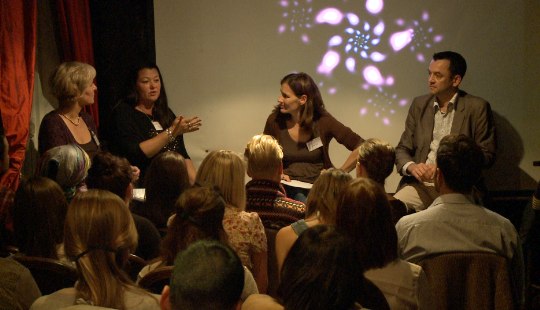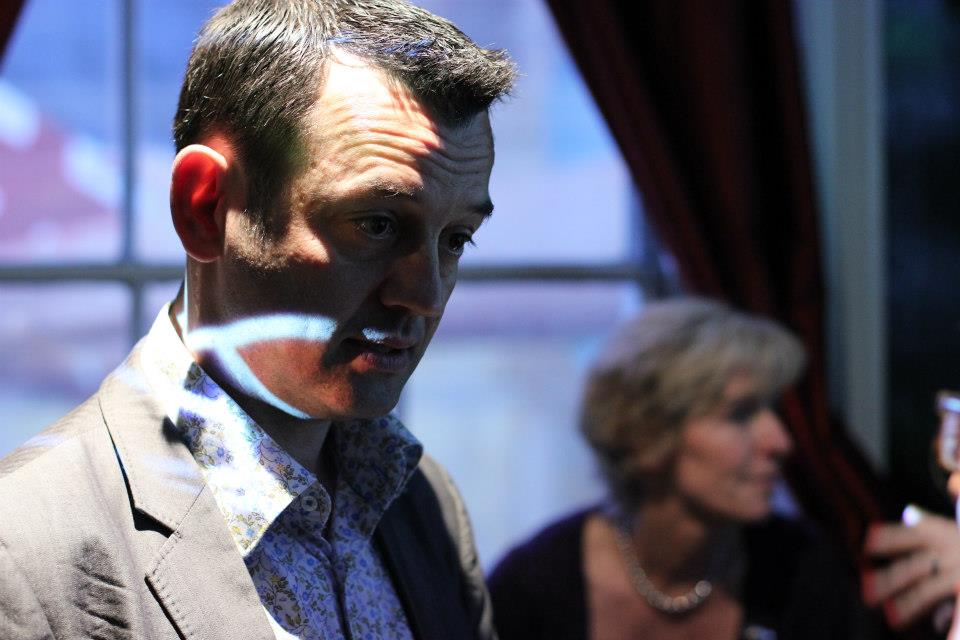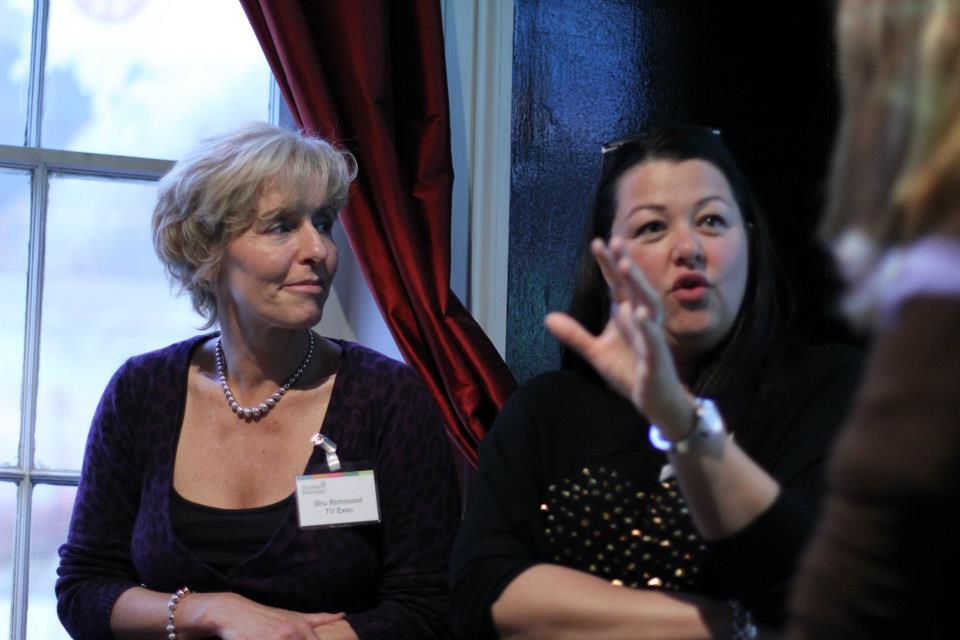Elsa, Daniell and Shu have written extensively about getting into TV, coving everything from CVs, internships, finding work experience and writing coving letters. Find out more about their books and blogs:
'How To Get a Job in Television' by Elsa Sharp
'An Experts Guide to Getting into TV' by Shu Richmond
Follow Daniell's TV and Career advice on twitter - @careermakeover
For more information about the MGEITF scheme's that Caroline discuessed, take a look at The Network and Ones to Watch.

What are the key attributes people should possess to keep a successful career in telly...
Elsa's initially stuck by enthusiasm, by how tenacious and charming people are. If she thinks they’re a good match with a team that counts for a lot. She’s given breaks to people with less experience in TV if they’re impressive as a person and she has a gut feeling about them.
Daniell Looks for people who come across as creative, with something extra on their CV e.g. relevant work experience. He says it is important to make your own ‘work experience’ by making your own projects – films, blogs etc.
Caroline said 'The Network' is the Edinburgh TV Festival scheme for new entrants and the people who succeed from that tend to be the type of people who follow up with emails and have the tenacity to plug away not just sit back and wait for opportunities to happen to them.
Shu agreed with Elsa that 'people skills' are important but says you sometimes see people doing well in TV because of their people skills when in fact they don't actually have much aptitude for the job. “I don’t think it necessarily stops you getting a job if you don’t have these skills; it simply means you’ll have to work harder in learning how to communicate.” She says other important attributes include a willingness and enthusiasm. “Producers love people who say ‘I’ll sort that out for you’. No Producer or PM wants to hear a problem without a solution. Think about ‘what does that person want to hear from me’."

The Talent Manager's Sarah Lee with Daniell Morrisey and Caroline Meaby
How do you go about selling your skills without coming across as arrogant or over confident?
Elsa –Talking frankly is often the best way. Being passionate about what you ‘ve done is engaging and is something she welcomes. “It’s about being open about your skills and experience, and if you haven’t done something admitting it.”
Shu warned against comparing a role on a student film with the same role on a broadcast project. “The truth is they want a credit on a broadcast show, and you will still be judged the same way they judge everyone else” .
How can you demonstrate that you’ve got the skill base if you don’t have the credits?
Daniell – It’s about being realistic, you have to recognise that you’ll come in as a runner and move on, you might move fast, but you still need the experience
Elsa has had people turn down a role because they thought their skills/ experience were too superior after cutting their own film, which is so short-sighted. She says she wouldn’t be doing her own job if she recommended someone for a producers job and they had never made a programme.
Shu – A TV employer doesn’t hire someone for life, they’re not that interested in where you want to be in 5 years time, they have a job that needs doing and want to know you can do it. Once you’re in and form relationships, they’ll start to care about you, if you’re doing a fabulous job of what you’re doing they’ll consider you for other jobs. "By all means talk about personal projects, but don’t confuse or blur the lines between projects outside the broadcast arena and a broadcast credit."

BBC Children's Talent Exec, Daniell Morrisey

What are the ways of breaking into the industry?
Caroline suggests work experience, to get in and make contacts. Also look around at new entrant schemes such as the Edinburgh TV Festival scheme ‘The Network’. The major broadcasters all run schemes and events are great to hear about stuff. Speaking to people in telly, at whatever level is also good. "Be a sponge, get advice, contacts and network." When applying, be good at identifying transferable skills outside of the media; particularly at entry level e.g. people skills in a part-time job.
Daniell – Look at BBC trainee schemes, in Production, Journalism...etc. (www.bbc.co.uk/careers/trainee-schemes). Sign up for job alerts, ITV, Channel 4, and Indies all run schemes. Find opportunities to network, make contacts and find your own opportunities.
Shu – Get on twitter, where the whole purpose is to pass on information. There’s lots going on, but you need to have access to that information, Shu’s blog wanttoworkintelevision.com is a good place to hear about schemes and opportunities when they arise.
Elsa – Company networks and databases. Target companies who make the shows that you want to work on, look at how they recruit. They’re all so transparent now, and list all their schemes on websites and their Facebook pages.
Once you’re in the industry, what can you do to keep getting offered a variety of interesting jobs?
Shu – The best time to make contacts and network is when you’re in a job. Tell people what you want to do. She say's “I spent a good part of my career thinking everybody else was a mind reader, ‘well surely they know I want to be promoted?!’ Don’t be afraid to do the obvious, which is to tell people what you want to do.” Choose your time, do what you’re doing really well first – not on the 2nd day of runner job – endear yourself to people that matter, form contacts and don’t be afraid to say what you really want to be.
Daniell – Don’t be afraid to ask people how they got in, people are willing to give advice
Elsa – Has found that people who progress do so because other people report back that they have done a good job and says if you do your job well you’ll be wanted on the same team again
Shu – It often happens if someone ‘gets you’, and they act as your mentor/ sponsor within the team, it doesn’t have to be the boss or producer, “today’s runner could be tomorrow’s producer, certainly tomorrow’s researcher”. Execs listen as much to the runner as the researchers, AP or Director when looking for someone to fill a role
Caroline – reiterates that keeping close to those just a little bit more senior than you is often a good thing.

TV Exec, Shu Richmond and Dragonfly Talent Manager, Elsa Sharp
What can you be doing once you’re in the industry, to try and consolidate your career?
Daniell – Be curious, know the industry, know what’s going on... Know who’s commissioning, what’s being commissioned, who are the names and companies.
Elsa – Be good at spotting trends. If someone has a hit, all the other channels will want to copy, and if you’re on that hit, you’re guaranteed career progression. She says she often gets calls from other companies wanting a list of people who worked on sucessfull Dragonfly sereis'.
If you’re embedded in a company it might be wise to start on lesser known shows with a view to getting on their larger, high rating shows. Try to get on something that will give you the experience to allow you to get known within the company before going onto their bigger series.
She also reccomends targeting companies who're making innovative programmes in order to keep ahead of the curve, and identify companies that are growing.
Shu – If you’re creative, use your down time or unemployment to develop ideas, it’ll give you the opportunity to show that you’ve got what companies are looking for. It’s about spotting stories and storytelling. Practice writing a proposal, get feedback and do something constructive
Daniell – “If you’re creative and have ideas, it doesn’t matter if you’re a runner or an exec producer... Ideas are the blood of the industry”
If you’re trying to get into a different genre or coming from a different country, and feel that’s a negative, is that a way to reposition yourself?
Daniell – Target someone with an idea and understand what’s being commissioned.
Elsa – “Develop something on a theme that’s popular. Mental health is a big issue for Ch4, I’m seeing young filmmakers who’ve made films about mental illness, I might consider one of these for a researcher”, they already have an interest, track record and already have access to sources. Use your specialist knowledge or interest to get a break on a high profile show.
Shu – Use and identify any skills or experience you have outside of media that’s relevant to the programme – e.g. if you had a stint working as an estate agent, could help in getting in on a property show
And do you have any key interview tips?
Daniell – 90% of people fail due to lack of preparation and not knowing about the programmes made. From runners to Head of the Deptartment.
Elsa - watch what’s going out now, not what was on 5 years ago. Understand what the company are making, understand what they are looking for; commissions are often based on similar genres or styles.
What advice do you have for people trying to make a transition or get their first credit in a more senior role?
Shu – "Sometimes you have to move out to move on." On long running shows you can get seen as a certain person and people struggle to see you as someone else. But, on those types of shows, there are more opportunities to volunteer to step up and fill in if someone’s away, take chances you maybe given by someone who supports you on the team. Tell them you’d love to have a go at a role, if you're a Researcher, find out what the AP does that a Researcher doesn’t. Ask to try writing proposals, ask for feedback, make clear you want to move on and you’re capable of doing it.
Elsa - When working with people that know and trust you, when the opportunity comes up they’ll give you the break/ credit. E.g. an AP on a successful series might be given an opportunity as a producer on a smaller series with a smaller team. It's her part of her job as a talent manager to spot potential and keep them in the company by giving a break and furthering skills
Daniell – It can be similar at the BBC, people who’ve expressed an interest in writing may be given the opportunity to write an episode.
How frequently is it ok to contact a talent manager?
Daniell – Have a reason or a hook, e.g. if there's something you've done recently that connects with what the company is making at that time.
Elsa – Tone is important, don’t say you’re still out of work since last contact, they'll question why. Don’t approach with aggression or accusing tone – ‘why haven’t you contacted me?’ etc. Sometimes it's about having the right skillset at the right time, and hassling for an answer when the truth is brutal is not the right way. Your name will be seen and recognised for all the wrong reasons.

Audience Questions
How long should you stay in a job before you move on?For example when you're working in a company rather than on a project...
Elsa – "If you feel that you’re progressing in a company, getting credits and experience working on shows you want to work on, then I would stay." It can be a really good training ground to work within a company, because you’ll get a breadth of credits and experience. If you feel you’re stagnating and not getting the opportunities or if you’re in an indie and they’re making shows you don’t necessarily watch that might be the time to go.
Shu – When you get frustrated you know, as long as you express what you want to do and when opportunities aren’t there you should start looking elsewhere. It’s always better applying for job when you’re in a job but think carefully before leaving
I’ve fallen into working on obs doc series’ with indies, but a lot of what I want to so is studio entertainment work, but I’ve been taking obs docs because that’s what’s come up and been offered, but I’m getting to the stage where my CV shows I’m a docs guy , not studio... What will be the big hook that’ll make me move from docs?
Elsa – look at doc shows with entertainment elements, the hybrids, the X Factor type shows. At [logger] level you can change direction, just about being persistent and finding out what’s in production. Working on long running shows that require big teams.
I’ve been working in news and journalism for the last 7 years and was recently offered an AP position within ITN. Obviously it’s quite a shift, should I take a step down for researcher roles or try to get more AP roles?
Caroline doesn't think there’s anything wrong in going backwards or sideways as Daniell noted. “George Entwhitlse at Edinburgh TV festival last year talked about his career progression, he’d said gone backwards to get skills he wanted to work on projects he’d wanted to do”
She say's “I always wanted to be really confident in what I was doing before I tried to make the next move. Some people can blag it a bit more, but I wanted to know my stuff so I would say it probably isn’t a bad thing to move sideways”
Daniell – “Don’t get too stuck on the idea you have to be runner then a junior researcher then a researcher than an AP, doesn't necessarily need to flow like that”
Shu – it's about a level of honesty as well, if you go for another job and said 'I decided to take this position and back a step because I needed to develop certain skills and now feel more confident', then that’s going to be an asset.
Elsa - It depends on the project, if you have a lot of experience in news, she says she wouldn’t take a step back unless it’s for the right show, if it’s for a high rating show with an incredible company. But with that level of experience, try and stay within ITN and get other AP credits or use your skills and speciality knowledge that have to get an AP credit somewhere else.

